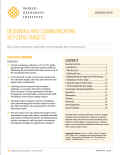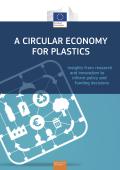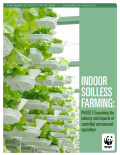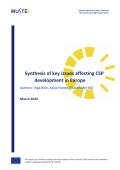


This Innovation Analysis from The Markets Institute at WWF examines the environmental impact of various systems of indoor soilless farming. These systems include hydroponics, aquaponics, and aeroponics in greenhouse and vertical settings.
Soilless vertical and indoor urban farming is a growing niche industry that aims to reduce many of the environmental impacts of conventional agriculture. At scale, this method of farming could decrease pressures on land, biodiversity, natural habitat, and climate. However, the industry also faces hurdles that prevent it from moving beyond its current specialisation. This analysis looks at how we might address some of these challenges and help bring these systems to scale.
Through Phase 1, this report explores the possibility of boosting the domestic - and eventually global - indoor soilless farming industry by leveraging stranded assets and building a robust coalition of local partners to launch a pilot farming system. Phase I activities included:

